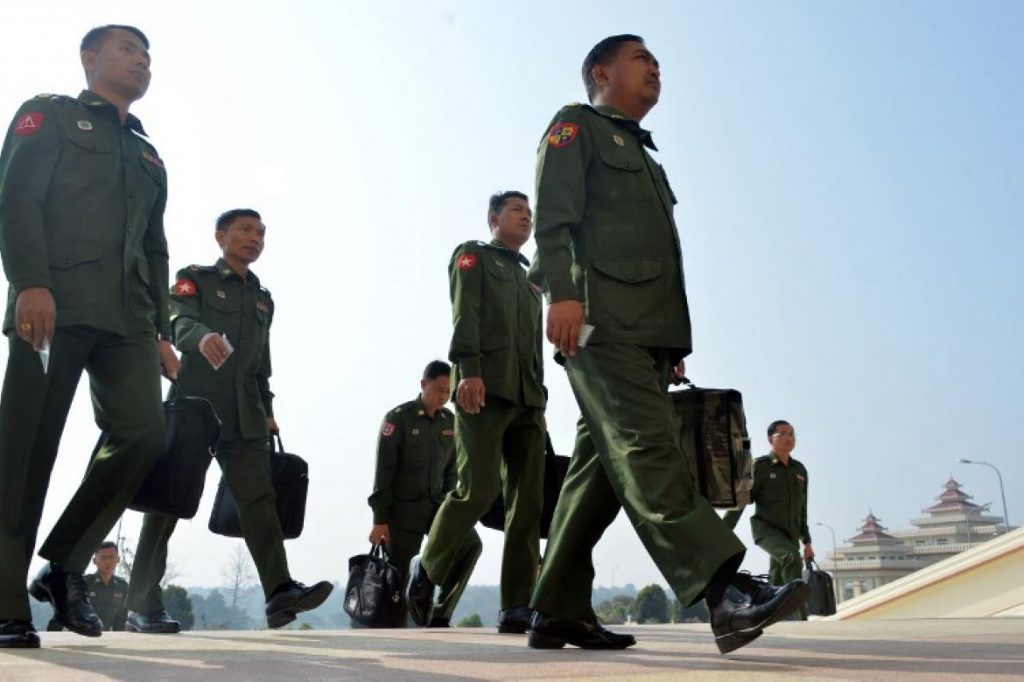
YANGON — Myanmar’s Union parliament approved the formation of a joint committee to draft amendments to the constitution on Tuesday, despite objections by representatives of the military and the opposition Union Solidarity and Development Party.
The vote brings the ruling National League for Democracy party a step closer to meeting an election promise to amend the military-drafted charter, after upper house lawmaker U Aung Kyi Nyunt (NLD, Magway-4) submitted an emergency motion to form the joint committee on January 29. The Union legislature approved the proposal on February 6.
U Htun Htun Hein, deputy lower house speaker and chair of the newly formed joint committee, told parliament on Tuesday that the committee would have 45 members. U Aye Tha Aung, the deputy speaker of the upper house, has been appointed deputy chair of the committee, he said.
The USDP has been offered two seats, and the military has been offered eight seats, Htun Htun Hein said, representing the proportion of seats that political parties and the Tatmadaw hold in parliament. But military and USDP representatives had not yet submitted a list of nominees, he said.
Support more independent journalism like this. Sign up to be a Frontier member.
Htun Htun Hein said the committee would be dissolved after it had submitted recommendations for constitutional reform to the Union parliament.
This is the NLD’s first attempt to reform the charter in the current parliament, despite the party’s energetic campaign for constitutional reform while in opposition to the previous, USDP-led government, and during its 2015 election campaign.
The assassination of NLD legal adviser and prominent constitutional reform advocate U Ko Ni on January 29, 2017 was widely seen as a warning against efforts to amend the constitution, which guarantees a role for the military in politics.
In what seemed a direct challenge to the NLD’s move, on February 11, lower house lawmaker U Thaung Aye (USDP, Pyawbwe) submitted a bill to amend section 261 of the charter. If approved, the amendment would see the chief ministers of states and regions elected by local parliaments, instead of being appointed by the president. The bill was signed by 143 military and USDP representatives.
On Tuesday, Union parliament speaker U T Khun Myat told lawmakers that he would announce the names of the military and USDP nominees once he had received them. He also said the Joint Bill Committee would scrutinize the draft constitutional amendment submitted by Thaung Aye before it could be debated in parliament.
During a break in Tuesday’s session, lower house military lawmaker Brigadier General Maung Maung told reporters that military lawmakers wanted more seats on the constitutional amendment committee.
“We waited for them [the NLD] to give us more seats, but they didn’t,” he said.
He accused the NLD of professing to support democracy, but failing to adhere to basic democratic standards.
“They don’t respect minority rights in parliament,” he said.
When Aung Kyi Nyunt tabled the surprise motion on January 29, Brig-Gen Maung Maung challenged it immediately. He told parliament it was invalid because it violated parliamentary protocol. A bill for amending the constitution should have been proposed first, to govern the committee’s work, he said.
The Tatmadaw’s Commander-in-Chief Senior General Min Aung Hlaing has said the military would not oppose changes to the constitution if it believed they were in the national interest.
Yangon-based political analyst U Yan Myo Thein told Frontier on February 6 that the new committee is likely to focus on sections 59(f), 436(a) and 261 of the constitution.
Section 59(f) prevents Myanmar citizens with immediate family members holding foreign citizenship from contesting the presidency, and is seen as a tool to prevent State Counsellor Daw Aung San Suu Kyi from becoming president.
Section 436(a) grants military lawmakers an effective veto over charter change, because it requires a vote of more than 75 percent of Union parliament representatives and the Tatmadaw holds 25 percent of seats.